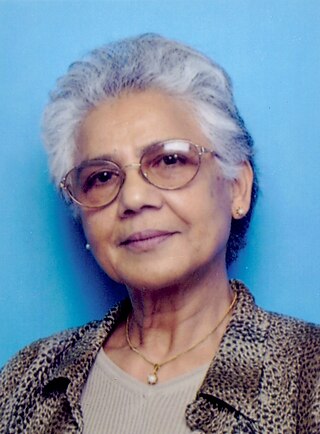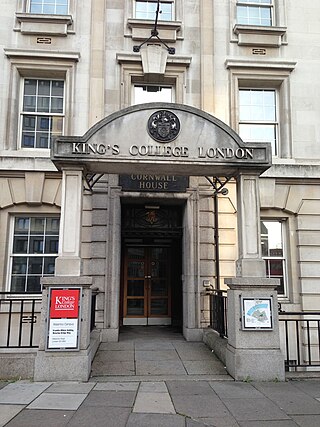Related Research Articles
The following outline is provided as an overview and topical guide to linguistics:

Michael Alexander Kirkwood Halliday was a British linguist who developed the internationally influential systemic functional linguistics (SFL) model of language. His grammatical descriptions go by the name of systemic functional grammar. Halliday described language as a semiotic system, "not in the sense of a system of signs, but a systemic resource for meaning". For Halliday, language was a "meaning potential"; by extension, he defined linguistics as the study of "how people exchange meanings by 'languaging'". Halliday described himself as a generalist, meaning that he tried "to look at language from every possible vantage point", and has described his work as "wander[ing] the highways and byways of language". But he said that "to the extent that I favoured any one angle, it was the social: language as the creature and creator of human society".
Critical discourse analysis (CDA) is an interdisciplinary approach to the study of discourse that views language as a form of social practice. CDA combines critique of discourse and explanation of how it figures within and contributes to the existing social reality, as a basis for action to change that existing reality in particular respects. Scholars working in the tradition of CDA generally argue that (non-linguistic) social practice and linguistic practice constitute one another and focus on investigating how societal power relations are established and reinforced through language use. In this sense, it differs from discourse analysis in that it highlights issues of power asymmetries, manipulation, exploitation, and structural inequities in domains such as education, media, and politics.
Intertextuality is the shaping of a text's meaning by another text, either through deliberate compositional strategies such as quotation, allusion, calque, plagiarism, translation, pastiche or parody, or by interconnections between similar or related works perceived by an audience or reader of the text. These references are sometimes made deliberately and depend on a reader's prior knowledge and understanding of the referent, but the effect of intertextuality is not always intentional and is sometimes inadvertent. Often associated with strategies employed by writers working in imaginative registers, intertextuality may now be understood as intrinsic to any text.

Jonathan Potter is Dean of the School of Communication and Information at Rutgers University and one of the originators of discursive psychology.

Discourse analysis (DA), or discourse studies, is an approach to the analysis of written, spoken, or sign language, including any significant semiotic event.
Norman Fairclough is an emeritus Professor of Linguistics at Department of Linguistics and English Language at Lancaster University. He is one of the founders of critical discourse analysis (CDA) as applied to sociolinguistics. CDA is concerned with how power is exercised through language. CDA studies discourse; in CDA this includes texts, talk, video and practices.

Systemic functional linguistics (SFL) is an approach to linguistics, among functional linguistics, that considers language as a social semiotic system.
Theodoor Jacob "Theo" van Leeuwen is a Dutch linguist and one of the main developers of the sub-field of social semiotics. He is also known for his contributions to the study of Multimodality; he wrote with Gunther Kress Reading Images: The Grammar of Visual Design, one of the most influential books on the topic.
Michael Silverstein was an American linguist. He was the Charles F. Grey Distinguished Service Professor of anthropology, linguistics, and psychology at the University of Chicago. He was a theoretician of semiotics and linguistic anthropology. Over the course of his career he created an original synthesis of research on the semiotics of communication, the sociology of interaction, Russian formalist literary theory, linguistic pragmatics, sociolinguistics, early anthropological linguistics and structuralist grammatical theory, together with his own theoretical contributions, yielding a comprehensive account of the semiotics of human communication and its relation to culture. He presented the developing results of this project annually from 1970 until his death in a course entitled "Language in Culture". Among other achievements, he was instrumental in introducing the semiotic terminology of Charles Sanders Peirce, including especially the notion of indexicality, into the linguistic and anthropological literature; with coining the terms metapragmatics and metasemantics in drawing attention to the central importance of metasemiotic phenomena for any understanding of language or social life; and with introducing language ideology as a field of study. His works are noted for their terminological complexity and technical difficulty.
Social semiotics is a branch of the field of semiotics which investigates human signifying practices in specific social and cultural circumstances, and which tries to explain meaning-making as a social practice. Semiotics, as originally defined by Ferdinand de Saussure, is "the science of the life of signs in society". Social semiotics expands on Saussure's founding insights by exploring the implications of the fact that the "codes" of language and communication are formed by social processes. The crucial implication here is that meanings and semiotic systems are shaped by relations of power, and that as power shifts in society, our languages and other systems of socially accepted meanings can and do change.

Charles Bazerman is an American educator and scholar. He was born and raised in New York. He has contributed significantly to the establishment of writing as a research field, as evidenced by the collection of essays written by international scholars in Writing as A Human Activity: Implications and Applications of the Work of Charles Bazerman. Best known for his work on genre studies and the rhetoric of science, he is a Professor of Education at the University of California, Santa Barbara, where he also served as Chair of the Program in Education for eight years. He served as Chair of the Conference on College Composition and Communication, delivering the 2009 CCCC Chair's Address, "The Wonders of Writing," in San Francisco, California.

James Gee is a retired American researcher who has worked in psycholinguistics, discourse analysis, sociolinguistics, bilingual education, and literacy. Gee most recently held the position as the Mary Lou Fulton Presidential Professor of Literacy Studies at Arizona State University, originally appointed there in the Mary Lou Fulton Institute and Graduate School of Education. Gee has previously been a faculty affiliate of the Games, Learning, and Society group at the University of Wisconsin–Madison and is a member of the National Academy of Education.

Ruqaiya Hasan was a professor of linguistics who held visiting positions and taught at various universities in England. Her last appointment was at Macquarie University in Sydney, from which she retired as emeritus professor in 1994. Throughout her career she researched and published widely in the areas of verbal art, culture, context and text, text and texture, lexicogrammar and semantic variation. The latter involved the devising of extensive semantic system networks for the analysis of meaning in naturally occurring dialogues.

James Robert Martin is a Canadian linguist. He is Professor of Linguistics at The University of Sydney. He is the leading figure in the 'Sydney School' of systemic functional linguistics. Martin is well known for his work on discourse analysis, genre, appraisal, multimodality and educational linguistics.

Donald Gene Truhlar is an American scientist working in theoretical and computational chemistry and chemical physics with special emphases on quantum mechanics and chemical dynamics.

Asoke Nath Mitra was an Indian theoretical physicist. He was a lifetime professor emeritus at Delhi University. He is known for his work in nuclear physics, particle physics and quantum field theory and in particular, for his fundamental contributions in obtaining the exact solution of the nucleon 3- body problem with separable potentials which led to the few nucleon studies, quark-recoil effect, development of an integrated dynamics of 2- and 3- body systems from nucleons to quarks as well as for the development of quark dynamics and relativistic quark models for hadrons in the Bethe-Salpeter framework. He was awarded the Shanti Swarup Bhatnagar Prize in 1969.
Martin Nystrand is an American composer and education theorist. He is Louise Durham Mead Professor Emeritus in the Department of English at the University of Wisconsin–Madison and Professor Emeritus of Education at the Wisconsin Center for Education Research.
Michele Zappavigna is an Australian linguist. She is an associate professor at the University of New South Wales, Sydney. Her major contributions are based on the discourse of social media and ambient affiliation. Her work is interdisciplinary and covers studies in systemic functional linguistics (SFL), corpus linguistics, multimodality, social media, online discourse and social semiotics. Zappavigna is the author of six books and numerous journal articles covering these disciplines.

The School of Education, Communication & Society (ECS) is an academic school within the Faculty of Social Sciences and Public Policy at King's College London. It offers undergraduate, postgraduate, PGCE teacher training and PhD research opportunities in the fields of Education, Linguistics and Social Sciences. The school is known for its teaching and research expertise in science and mathematics education; language, culture and communication; and public policy.
References
- ↑ "Glsconference.org biography". Archived from the original on 2008-10-13. Retrieved 2010-01-21.
- ↑ Talking Science at Google Books.
- ↑ Textual Politics at Google Books.